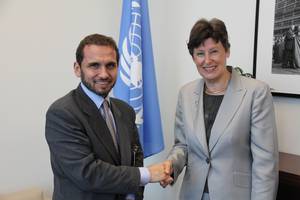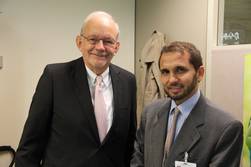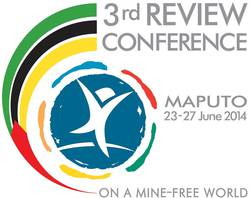10.06.2014
Download the press release PDF 150KB
Snapshots of UNICEF and UNODA at Convention-related activities on Flickr.
New York – His Royal Highness Prince Mired Raad Al Hussein of Jordan, special envoy of the Anti-Personnel Mine Ban Convention, or Ottawa Convention, has commended the United Nations for its long-standing support to ending the suffering and casualties caused by anti-personnel mines.
 “I wish to express my appreciation for the support provided by the United Nations in general, and by the Office for Disarmament Affairs in particular,” said Prince Mired during a meeting with the United Nations’ Special Representative for Disarmament Affairs, Angela Kane.
“I wish to express my appreciation for the support provided by the United Nations in general, and by the Office for Disarmament Affairs in particular,” said Prince Mired during a meeting with the United Nations’ Special Representative for Disarmament Affairs, Angela Kane.
“The Office for Disarmament Affairs plays an important role in executing the UN Secretary-General’s functions as the Convention’s depository and I am pleased that Angela Kane will take part in the upcoming Maputo Review Conference,” added Prince Mired.
The Maputo Review Conference is the Convention’s third five-year review, which will take place in the Mozambican capital from 23 to 27 June.
“I hope that the United Nations and its Office for Disarmament Affairs will remain strongly committed to the Convention following Maputo,” said Prince Mired.
Prince Mired also made a similar appeal to UNICEF Executive Director, Anthony Lake.
 “UNICEF historically has been at the forefront of UN efforts to effectively address the problems caused by anti-personnel mines,” said Prince Mired.
“UNICEF historically has been at the forefront of UN efforts to effectively address the problems caused by anti-personnel mines,” said Prince Mired.
“Thanks to UNICEF’s efforts, a great deal of progress has been made but more needs to be done. I encourage the United Nations’ Children Fund to remain committed to this cause. We have accomplished a great deal but our task is not yet complete.”
At his meeting with Anthony Lake, Prince Mired noted that UNICEF plays a dual role in supporting the aims of the Convention.
“UNICEF naturally has taken the lead in child protection as concerns the dangers posed by anti-personnel mines and other explosive remnants of war and it is also a leader in promoting the rights of persons with disabilities,” said Prince Mired.
“This is important in ensuring that the rights of landmine victims will be guaranteed, including girls and boys whom have been directly or indirectly affected by these weapons.”
“At the Maputo Review Conference, we will no doubt celebrate that, since the Convention entered into force, tremendous progress has been made,” said Prince Mired. “However, our work is not yet complete. My hope is that the UNODA, UNICEF and other UN agencies will remain engaged in this cause.”
 Over 1,000 representatives of States and international and non-governmental organizations are expected to gather in the Mozambican capital at the 23-27 June Maputo Review Conference.
Over 1,000 representatives of States and international and non-governmental organizations are expected to gather in the Mozambican capital at the 23-27 June Maputo Review Conference.
The purpose of the Maputo Review Conference is to assess progress in the pursuit of the Convention’s humanitarian aims over the past five years and to adopt the Maputo Action Plan to guide efforts to achieve further progress from 2014 to 2019.
The Anti-Personnel Mine Ban Convention was adopted in Oslo in 1997, opened for signature in Ottawa the same year and entered into force on 1 March 1999. To date, 161 States have joined the Convention.
Since entering into force, millions of square metres of once dangerous lands have been released for normal human activity and more than 47.5 million stockpiled mines have been destroyed.




 Over 1,000 representatives of States and international and non-governmental organizations are expected to gather in the Mozambican capital at the 23-27 June Maputo Review Conference.
Over 1,000 representatives of States and international and non-governmental organizations are expected to gather in the Mozambican capital at the 23-27 June Maputo Review Conference.